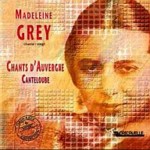Canteloube’s irresistible Songs of the Auvergne never fail to give at least some satisfaction, even in the most sanitized, glossiest versions. Natalia Davrath’s idiomatic recording of the complete series is the modern version of choice, but the classic, indispensable recording against which all others must be measured remains the first, from 1930, containing a selection of 11 songs sung by Madeleine Grey. They include some of the series’ most popular, like “Il Baïlero” and “Brezairola”, and they’re all done with rhythmic drive, impeccable diction of the dialect text, and with a typically French soprano voice of the period–clear, forward, with a touch of nasality and a hint of acidity, all fitting to these earthy songs. Alongside Grey’s brisk but fully characterized versions, others seem pale, their orchestras slick compared to the reedy rawness of the studio band led with verve by Elie Cohen.
It’s curious that a singer of Grey’s stature, sought out by leading composers such as Fauré, Villa-Lobos, Falla, Poulenc, and others, recorded so little. Ravel called Grey “the perfect interpreter of the Madécasses…among others,” so it’s fortunate that despite her slim discography she did record his Chansons Hébraïques and Chansons Madécasses with him. He may have been her pianist in the former (he’s credited as such, albeit with a question mark) and directed the latter, whose accompanying trio includes renowned flutist Marcel Moyse.
In both of the Ravel sets she sings with great feeling, thoroughly idiomatic in the Yiddish songs and vindicating Ravel’s praise in the Chansons Madécasses, capturing the languorous longing of “Nahandove” and the near-hysteria of “Aoua”. Grey’s simplicity and directness, heard in such abundance in the Auvergne songs, returns in eight charming folk-songs arranged by various hands including Arthur Honegger.
Cascavelle provides no texts in a booklet notable for a strange (and strangely translated) potted bio in three languages. But the transfers are quite good; the sound is alive and forward without the excessive filtering and noise removal that has ruined so many reissues of older recordings.
































